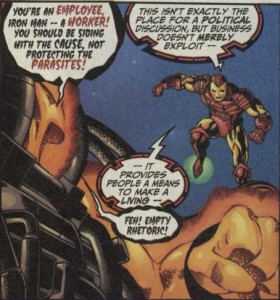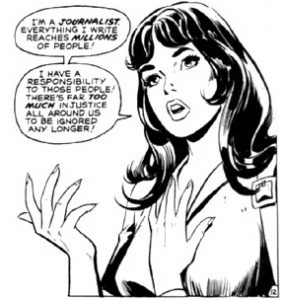 Last week was particularly busy in my work life (By day I work as a product manager at a pretty large software company), with a big time presentation for the senior staff and lots of trips back and forth from Los Angeles to San Jose, and I admit, I had a hard time thinking about what to write this week. But then I realized that this article, much like the others I have written, was staring at me in the face: I have been doing a lot of work, and once I gave myself a few moments, I realized: comics have made me better at my work!
Last week was particularly busy in my work life (By day I work as a product manager at a pretty large software company), with a big time presentation for the senior staff and lots of trips back and forth from Los Angeles to San Jose, and I admit, I had a hard time thinking about what to write this week. But then I realized that this article, much like the others I have written, was staring at me in the face: I have been doing a lot of work, and once I gave myself a few moments, I realized: comics have made me better at my work!
How can that be? How can the very same funny books that my mom used to “clean up” (throw away) when I wasn’t looking contribute to my career? How does reading about costumed metahumans make me a corporate superhero? Comics are an escape–if anything, they take you away from being productive!
Now, not to sound too much like my dad, but over the years, through my many jobs, I realize now that all of my gigs had one thing in common: storytelling. Writing. Presenting. Explaining to the people you work with, This is what I do, this is why you are happy I am doing it, this is why you should not bother me anymore and, actually, before you leave, I think we can both agree: I need a raise.
Let’s start with the most obvious aspect of modern corporate life that comic books help you succeed in: presentations. No matter what kind of work you do, chances are you are going to be asked to make a presentation in front of a group of people. Of course, if you are a teacher, you spend a lot of time doing this. Likewise, the longer you work in a company, the higher you progress in your organization, the more often people are going to ask you to give presentations.
Next to using Keynote instead of Powerpoint, my experience with comics has been the biggest reason why my presentations consistently kick corporate butt. (Oh, and I did a fantastic class at Duarte which helped a lot, too, but that’s a whole other level of craziness.) There are a few reasons for this: the best presentations are visual, with striking graphics, great story flow, and narratives that do not require text to understand.
Comics, my friend, comics. Comic book creators have shown me how use graphics and colors to guide the eye, they have helped me use transitions to build tension and to focus the audience. And comics have taught me that less truly is more. Comic book creators do so much in just a few pages—in just a few panes—that other mediums just cannot do. And comics do it without video or sound or animation. Like we discussed a few weeks ago, a great comic can tell a story without using language at all—same thing with presentations, which, more often than not, are sent to people to read on their own, without the presenter walking the viewer through them.
For all the lessons I have learned from a graphical point of view, it must be said: comic have made me a better writer. And, despite all the various technologies that help businesses run, nothing is more important than knowing how to clearly express an idea, especially if you are in an office that relies on email for the majority of day-to-day communication. Nothing is more distracting than getting an email that has grammar or spelling mistakes; it completely undermines the message the sender is trying to convey.
made me a better writer. And, despite all the various technologies that help businesses run, nothing is more important than knowing how to clearly express an idea, especially if you are in an office that relies on email for the majority of day-to-day communication. Nothing is more distracting than getting an email that has grammar or spelling mistakes; it completely undermines the message the sender is trying to convey.
Today’s comics are the best written comics in history, hands down. And I am not talking about their verbosity or correct use of punctuation. It’s really about understanding what is appropriate: sometimes a single sentence is more powerful than a paragraph of rationalization.
But it’s also about understanding how to convey emotion, right? We are so used to text boxes being used as personal narration that it easy to forget how that is a relatively modern way of doing things (when do you see thought bubbles these days?). Why is this important? Well, I would posit that when you use a thought bubble, the sentences are specific to the moment that is being shown in the panel. When the writer uses a narrative box, the character can comment on the moment or continue a longer arc of personal thoughts. Being able to express seriousness, whimsy, fear, hope, assertiveness…you need to do this in real life, too! Especially when people are less likely to pick up the phone and send a text or email instead. It’s funny, even with all this technology that makes it easy to talk or send video, it is the writing that is paramount.
Comic book writers (and editors) are also experts on making sure that tone and voice are consistent–like, Bruce Wayne needs to sound like Bruce Wayne, no matter what book he appears in. Writers, especially if they are making books “the Marvel way,” need to ensure that the words support the art, not distract. Same thing with your work communications: you want to convey a sense of hey, I’m in control, I know what I am talking about.
Comics also give me a kind of perspective that my peers don’t have. Like, I have fun in my life because comics are fun. I go to conventions, I am surrounded by fun people. I meet you all, and I am having fun. Remembering how to have a good time goes a long way in professional environments, especially when things are stressful. When we read books like Chew and Peanuts and Daredevil, we laugh out loud, we literally absorb that happy creative energy and react by laughing — a lot of people don’t necessarily let themselves laugh as often as we do.
 I cannot stress enough how important it is to bring the energy and vitality that you have when you read comics or when you talk about comics with your friends with you in all aspects of your life, especially your job. When someone at my day job asks me about iFanboy.com, it is always followed by something like, “that just sounds fun, to read comics, I wish I had something like that!” That’s important, you know why? Because people like having fun people around. It makes everyone feel better about their day.
I cannot stress enough how important it is to bring the energy and vitality that you have when you read comics or when you talk about comics with your friends with you in all aspects of your life, especially your job. When someone at my day job asks me about iFanboy.com, it is always followed by something like, “that just sounds fun, to read comics, I wish I had something like that!” That’s important, you know why? Because people like having fun people around. It makes everyone feel better about their day.
Finally, the joy of reading comics keeps you young. Yes, I deal with all kinds of craziness at work, but when I go back and read a comic featuring the same characters I was reading about after a long day of craziness in fourth grade, it connects you to your younger self, and keeps you from taking things too seriously. And if you are lucky enough to have a few minutes to spend time on sites like iFanboy to discuss these stories and heroes with others, all the better.
In my professional life, it is my job to understand how people use technology in their daily lives. The comic book community leverages all the technologies and services companies are paying attention to, whether it be the devices we use to read comics or the social networks and apps we use to keep in touch. Knowing how people use technology inspires the people making that technology to create more effective, relevant and secure products and services. By staying active in comics and the comic book community, we are also discovering ways to make sure the companies we work for remain relevant and compelling for customers—another surefire way to keep your job.
Who knew that all those hours reading Spider-Man and The Avengers could result in a better paycheck? In my case, the inspiration I have gained from reading comics have helped me be more creative at work, and the fact that I read so much has definitely made me a better writer. I’m curious to see how reading comics has helped your life, whether it be as a student, teacher, or corporate monkey like myself!
Mike Romo is an actor in Los Angeles. You can reach him through email, visit his facebook page, connect with him on google +, and collect his tweets on twitter.


Wow! Great article, Mike!
You’ve put into words a lot of the ideas that have been percolating in my brain since starting my first “office” job. As a video editor in a market research department, my whole job is about storytelling and distilling coherent narratives from mountains of research video. I credit comics for a lot of my communication skills. I’ve often been shocked at how things I see as commonplace and obvious are viewed as revolutionary in this environment.
Maybe I’ll send my boss your article when a performance evaluation comes up!
excellent article Mike. I totally agree with you. I’d even add, that there is incredible value to immersing yourself in pop culture, to be good at business.
Comics really do help keep me young, and more importantly, help my mind and imagination run wild. Its a creativity coffee.
so how can I get work to cover my tab, Business expense 🙂
I’ve always argued that reading comics as a child was a great benefit (particularly learning how to define words in context, building vocabulary, etc), but I hadn’t thought too much about how it can affect adult/working life. Great article Mike.
I can relate to so much of what you have articulated in this article and it rings true in my own work.
I’ve been producing videos for State and County governments for nearly 12 years and, without a doubt, comics have inspired how I frame and edit the final product.
Thanks Mike for the insights – Great read!
I’m in marketing – specifically responsible for electronic production including video (and as a copywriter long before that).
I’ve found comics inspirational in terms of storytelling, exploring different visuals and even just conceptualizing. Comics are all about imaginative storytelling. It’s feeding a different side of the brain.